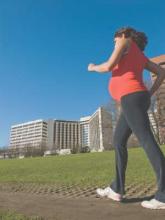Exercise and moderate weight loss – or even limited weight gain – during pregnancy can improve maternal outcomes, according to two recent studies.
Physical activity programs initiated during pregnancy can reduce the risk of gestational diabetes, according to results from a meta-analysis of randomized trials. And in another recently published study, researchers found that modest weight loss, or low weight gain, during pregnancy reduced the risk of gestational hypertension and certain adverse birth outcomes among obese women.
The meta-analysis, conducted by Brian W. Whitcomb, Ph.D., and colleagues at the University of Massachusetts, Amherst, and published in the March issue of Obstetrics & Gynecology, suggested a protective effect of exercise in pregnancy, though the included studies varied considerably in design and patient adherence (Obstet. Gynecol. 2015;125:576-82).
Of the 3,401 pregnant women in the 10 studies, the women randomized to aerobic exercise with or without strength training had a 28% lower risk of developing gestational diabetes mellitus than did women not randomized to exercise.
The studies varied in terms of types of interventions; some involved only walking, while others incorporated strength training and balance exercises. Body mass index was unrestricted in some, and other studies enrolled only overweight or obese women.
Adherence was as low as 16% in certain studies, and a third of patients were lost to follow-up, limiting the generalizability of the results. But the meta-analysis adds to the evidence base supporting an association between exercise during pregnancy and a lower risk of gestational diabetes mellitus, the researchers wrote.
“Because the benefit of exercise identified in this study occurred with physical activity that began after recognition of pregnancy and enrollment in prenatal care, these findings suggest clear future clinical and public health applications,” they wrote.
In a separate study also published in Obstetrics & Gynecology, a group of Belgian researchers found that obese women who lost weight during pregnancy or gained less weight than recommended under current Institute of Medicine guidelines had a reduced risk of gestational hypertension and emergency cesarean delivery, as well as macrosomia and large-for-gestational-age neonates (Obstet. Gynecol. 2015;125:566-75).


